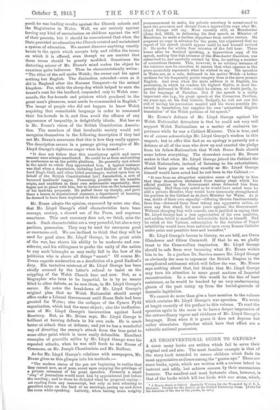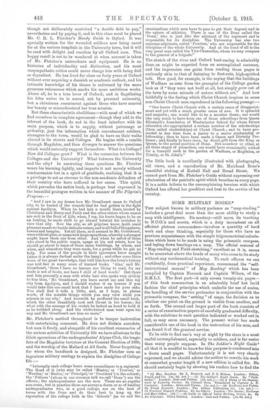AN UNCONVENTIONAL GUIDE TO OXFORD.* A GOOD many books are
written which fail to serve their original end and aim. The most familiar example is that of the story-book intended to amuse children which finds its most appreciative audience among the "grown-ups." There are some hooks, again, which are written with a serious intent to instruct and edify, but achieve success by their unconscious humour. The smallest and most fortunate class, however, is that of the books which kill two birds with one stone, which, A Huta v Guide to Oxford. Specially Written for the Wounded by C. it. L. Fletcher. Printed for the Author at the Oxford Univeraily PM& irrico for the duration of the war to the'puldio, le, net.]
though not deliberately contrived "a double debt to pay," nevertheless end by paying it, and in this class must be placed
Mr. 0. R. L. Fletcher's Handy Guide to Oxford. It was specially written for the wounded soldiers now being cared for at the various hospitals in the University town, but it will be read with delight and emotion by all Oxford men. This happy result is not to be wondered at when account is taken of Mr. Fletcher's antecedents and equipment. He is an historian of individuality and distinction, and his most unsympathetic critics could never charge him with being dull
or dryasclust. He has lived for close on forty years at Oxford without ever acquiring a donnish or academic outlook, and his
intimate knowledge of his theme is enlivened by the same generous vehemence which marks his more ambitious works. Above all, he is a true lover of Oxford; and in flagellating his boles noires he is moved, not by personal animosity, hut a chivalrous resentment against those who have marred her beauty or misunderstood her true mission.
But these characteristic ebullitions—with most of which we find ourselves in complete agreement—though they add to the interest of the book, do not in the least interfere with its main purpose, which is to supply, without patronage or pedantry, just the information which convalescent soldiers, strangers to the town, would be glad to have on their walks abroad in its streets and Colleges. He begins with a ramble through Magdalen, and then diverges to answer the questions
which would naturally suggest themselves : What is a College P How did Colleges grow ? What is the connexion between the Colleges and the University ? What between the University and the city P In answering these questions Mr. Fletcher wears his learning lightly, and imparts it not merely without condescension but in a spirit of gratitude, realizing that it is a privilege to act as cicerone to the non-academie defenders of their country who have suffered in her cause. This spirit, which pervades the entire book, is perhaps beat expressed in the beautiful prologue written in the manner of The Pilgrim's Progress
" And I saw in my dream how Mr. Greatheart came to Oxford city, to be healed of the wounds that he had gotten in the fight against Apollyon. When he had lain a month there, tended by Christiana and Mercy and Faith and the other sisters whose names are writ in the Book of Life, when, I say, his hurts began to be on an healing, he made shift to go abroad betwixt his crutches to view that city. Now the city, as all pilgrims know, lyeth amid pleasant meadows beside delicate waters, and is all full of fairpalaces, towers and temples. Yet all these, as it seemed to Mr. Greatheart, were without plan, or name writ large uponthem, whereby a stranger might know them one from other. And when he asked of those who stood in the public wayes, agape at his sad estate, how he should go about to learn of these same buildings, by whom, and when, and wherefore they were made, for a great while he gat no help. For some of the people in their ignorance knew naught (since it is always darkest under the lainp) ; Rnd other some there were, of too great knowledge, that told him how the town's history was writ fair in many score of learned books. 'Alas,' said Mr. Greatheart, these I have no leasure nor liking to read, for my trade is not of books, nor have I skill of hard words.' But there met him presently a man with white hair who spake very civil-1y to him thus, Mr. Greatheart, you have saved me and this my city from Apollyon, and I should reckon it an honour if you would take this one small book that I have made for your sake. You shall find it tells a. little, and, as I hope, in plaine words, of the notable things which you may view while you sojourn in our city.' And herewith he proffered the small book, which the other thankfully took and thrust in his bosom ; for what with the manage of his crutch he leaked an hand to hold it as he hobbled along. And the white-haired man went upon his way and Mr. Greatheart saw him no more."
Mr. Fletcher's method throughout is to temper instruction with entertaining comment. He does not disdain anecdote, but uses it freely, and alongside of his excellent summaries of the serious activities of University life we have allusions to the illicit operations of the undergraduates' Alpine Club, the tragic fate of the Magdalen tortoises at the General Election of 1880, and the worship of the Mallard at All Souls. Never forgetting for whom the handbook is designed, Mr. Fletcher uses an ingenious military analogy to explain the discipline of College Life :— "Internally each college bears some resemblance to a regiment. The Head of it (who may be called 'Master,' or Provost,' or 'Warden,' or Rector,' or 'Principal,' or l President') is the colonel; the • Fellows '(whom in our common talk we call ' Dons ') are the officers; the undergraduates are the men. There are no regular non-corns., but in practice there are always a dozen or so of leading undergraduates who, in a good college, are on the best of terms with the Dons and do their best to keep up the reputation of the college both in the 'Schools' (as we call the
examinations which men have to pass to get their degree) and in the sphere of athletics. There is one of the Dons called the 'Dean,' who is just like the adjutant of the regiment and is responsible for its discipline. The University has also two supreme adjutants, called Proctors,' who are responsible for the discipline of the whole University. And at the head of all is the very great man called the Vice-Chancellor, whom we may compare to the general of a brigade."
The sketch of the river and Oxford boat-racing is admirably done, as might be expected from an accomplished oarsman, and the impression one gains from reading these pages is curiously akin to that of listening to first-rate, high-spirited talk. How good, for example, is the saying that the buildings
of Wadham as seen from the grassplot of the College garden look as if" they were not built at all, but simply grew out of the lawn by some miracle of nature without art." And how faithfully is the feeling which Christ Church inspires in some non-Christ Clhureh men reproduced in the following passage:— " Ono leaves Christ Church with a certain sense of disappoint- ment and yet with a much greater sense of awe. It is splendid and majestic ; one would like to be a member there ; one would like very much to have been one of those schoolboys from Queen Elizabeth's foundation of Westminster School for whose future education she appropriated a certain number of the scholarships (then called studentships) at Christ Church ; and to have pro- ceeded in due time from a junior to a senior studentship or fellowship ; then to have been made a Canon and Divinity Pro- fessor; and finally to have risen, by direct gift from the King or Queen, to the proud position of Dean. But somehow or other, at all these stages of promotion, one would have occasionally wished for a tranquil nook in the garden of Waclliam, or Magdalen, or Trinity, or St. John's."
The little book is excellently illustrated with photographs, old views, and a reproduction of Mr. Muirhead Bone's beautiful etching of ICettell Hall and Broad Street. We cannot part from Mr. Fletcher's Guide without expressing our admiration of the patriotic spirit which breathes in every page. It is a noble tribute to the uncomplaining heroism with which Oxford has offered her goodliest and best to the service of her country.















































 Previous page
Previous page